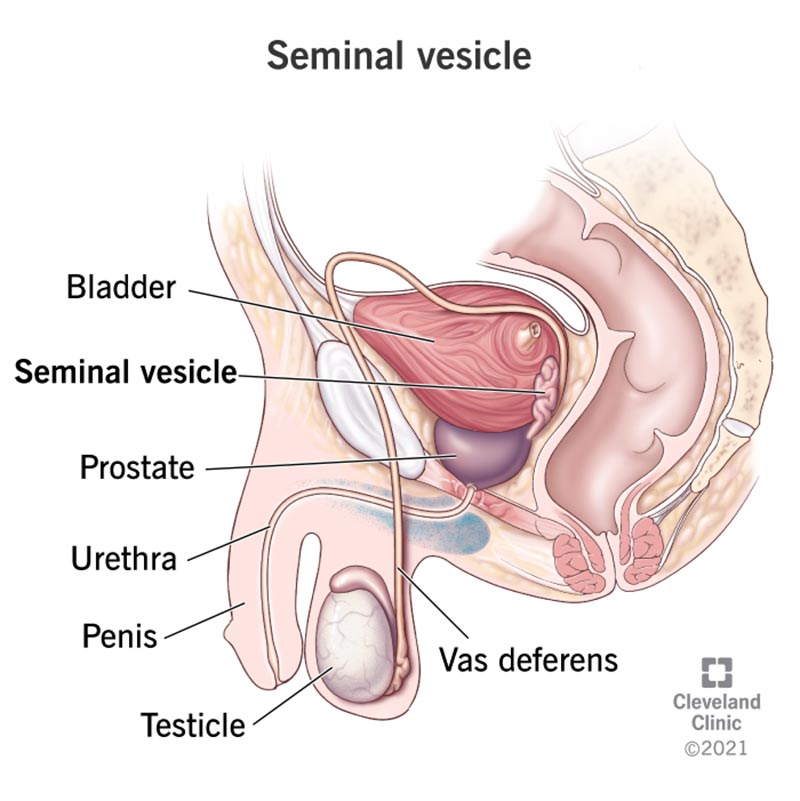Your seminal vesicles are coiled pouches or sacs behind your bladder but in front of your rectum. They’re about 2 inches long and help with fertility.
Advertisement
Cleveland Clinic is a non-profit academic medical center. Advertising on our site helps support our mission. We do not endorse non-Cleveland Clinic products or services. Policy

Image content: This image is available to view online.
View image online (https://my.clevelandclinic.org/-/scassets/images/org/health/articles/22433-seminal-vesicle-2446360)
Seminal vesicles (pronounced “SEM-uh-nl” “VES-i-kuhls”) are glands in the male reproductive system. They produce fluids that turn into semen. Semen is a reproductive fluid that usually carries sperm cells. Most males have two seminal vesicles.
Advertisement
Cleveland Clinic is a non-profit academic medical center. Advertising on our site helps support our mission. We do not endorse non-Cleveland Clinic products or services. Policy
Other names for seminal vesicles include:
Seminal vesicles are part of your reproductive system and help produce semen. Your reproductive system’s primary function is to help produce babies.
The vesicles have glandular tissue and muscular tissue. The muscular tissue squeezes (contracts) to move seminal fluid and sperm into your urethra and out through your penis.
Your seminal vesicles work together with other parts of your reproductive system. For example, your vesicles connect to your vas deferens and ampulla (a structure that stores and helps transport sperm) and work together to push semen into and out of your penis.
The fluids that develop in your seminal vesicles make up approximately 50% to 80% of your semen’s volume. The substances in these fluids help keep your sperm during their journey to attempt to fertilize an egg (ovum). The fluids carry:
Your seminal vesicles take about three days to refill after you ejaculate.
Advertisement
Your seminal vesicles are behind your urinary bladder but in front of your rectum. The tip of your vas deferens is near the vesicles. The vesicles connect to your prostate gland.
Lymph nodes are also nearby.
No, your seminal vesicles aren’t part of your prostate. Seminal vesicles are separate glands that sit above your prostate.
Seminal glands look like coiled bags or pouches. They combine glandular and muscular tissue. They also have blood vessels and nerves within them. A typical seminal gland is about 5 centimeters long (a little less than 2 inches). But it’s in a tight coil that would be twice as long if you were to stretch it out.
Sex hormones, especially androgens, cause your seminal vesicles to increase in size and become active around puberty. For many, ejaculation usually starts around this time.
Conditions and disorders that can affect your seminal vesicles include:
Not all of these conditions and situations are preventable. But wearing protective equipment (athletic cup and jock strap) during contact sports and practicing safe sexual intercourse can help maintain your reproductive health.
Common signs and symptoms that indicate that there may be an issue with your seminal vesicles include:
If a healthcare provider suspects you might have problems with your seminal vesicles, they may recommend one or more of the following tests:
Seminal vesicle treatment depends on the cause. Possible treatments include:
Seminal vesicles get bigger if you haven’t ejaculated in a few days. This won’t cause any problems.
If you need certain imaging tests, such as an MRI, healthcare providers may ask you to hold back on ejaculating for a few days so they can get a clear image of your seminal vesicles.
Advertisement
There are parts of your body that you might not think about until you notice signs that something feels wrong. Your seminal vesicles may be some of these body parts. Your seminal vesicles are important for reproduction because they help make seminal fluid and work with other body parts to push semen out when you ejaculate. Reach out to a healthcare provider if you have any symptoms that could indicate an issue, like pain in your abdomen or genital area, blood in your semen or problems with fertility.
Advertisement

Sign up for our Health Essentials emails for expert guidance on nutrition, fitness, sleep, skin care and more.
Learn more about the Health Library and our editorial process.
Cleveland Clinic’s health articles are based on evidence-backed information and review by medical professionals to ensure accuracy, reliability and up-to-date clinical standards.
Cleveland Clinic’s health articles are based on evidence-backed information and review by medical professionals to ensure accuracy, reliability and up-to-date clinical standards.
If you have a condition that’s affecting your urinary system, you want expert advice. At Cleveland Clinic, we’ll work to create a treatment plan that’s right for you.
